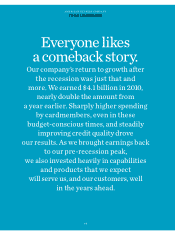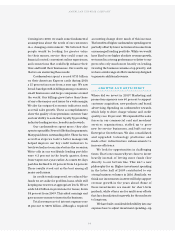American Express 2010 Annual Report Download - page 16
Download and view the complete annual report
Please find page 16 of the 2010 American Express annual report below. You can navigate through the pages in the report by either clicking on the pages listed below, or by using the keyword search tool below to find specific information within the annual report.
and new fee services, which I mentioned earlier.
We’ve brought in key talent to lead this group,
and we are confident that it will be a success.
A T O UGH E N VIRONMENT
I hope this gives you a feel for some of the exciting
things happening across our company. But, of
course, we also have our share of concerns.
Chief among them: the recovering yet still
troubled economy. Persistent unemployment,
housing weakness and budget deficits in a number
of countries continue to weigh on consumers and
businesses. While the headwinds aren’t blowing
at gale force anymore, they aren’t gentle breezes
either. We continue to be cautious about the
economy in 2011 despite some encouraging signs
of improvement.
Increased regulation is another challenge.
The past two years have been the most intense
period of regulatory change for our industry
since the 1930s. Everyone who experienced the
near collapse of the financial markets knows
that reforms were absolutely necessary. While
many aspects of financial reform don’t affect
our company because of our business model,
certain changes directed at the credit card
industry do impact us.
American Express supports reforms that
protect consumers and promote competition
and innovation in the marketplace. Our concern
lies with regulation that leads to unintended
consequences, such as provisions in the CARD
Act that constrain card issuers from pricing for
risk. These changes have led to higher costs and
limited access to credit for many Americans.
The CARD Act will have the biggest impact
on issuers who rely heavily on interest income
from basic revolving credit products, and back-
end and penalty fees. Because of our spend-based
model, it won’t aect us as much. While the CARD
Act has reduced yields on our lending portfolio,
we have taken steps to mitigate the impact.
The Durbin Amendment to the Dodd-Frank
Act is another high-profile change. It empowers
the Federal Reserve to limit interchange fees
for debit cards as well as certain prepaid cards.
The Fed’s initial proposal in December was very
aggressive, though a final decision on the rules
isn’t expected until this spring.
While they are a relatively small part of our
business, we do issue prepaid cards. We don’t,
however, issue debit cards. Still, a change in debit
pricing could impact the overall payments industry.
We won’t know the effect on the industry
until any regulations become final. Depending
on how far the reduction in debit interchange
goes, some merchants may try to steer customers
toward debit. However, doing so would disrupt
the sales process. In our experience, successful
merchants are not eager to risk losing the goodwill
of their customers. Beyond that, price controls
may make debit cards less attractive to issuers and
card holders. Consumers are likely to see higher
prices and fewer rewards tied to debit products
as the banking industry adjusts to lost revenues.
We oppose price controls on principle.
Government regulation of prices undermines
competition and ultimately harms the consumer,
and a growing number of policymakers are
pointing to the negative eects of such a policy.
The final Washington-related item I want
to address is the lawsuit that the Department of
Justice (DOJ) filed against American Express
in October.
The suit claims that certain provisions in our
merchant contracts violate antitrust law. In fact,
these provisions protect our cardmembers from
discrimination or disruption at the point of sale.
Our concern is that the DOJ’s approach would
put more power in the hands of the two largest
14
AMERICAN E XPRESS C OMPANY
























